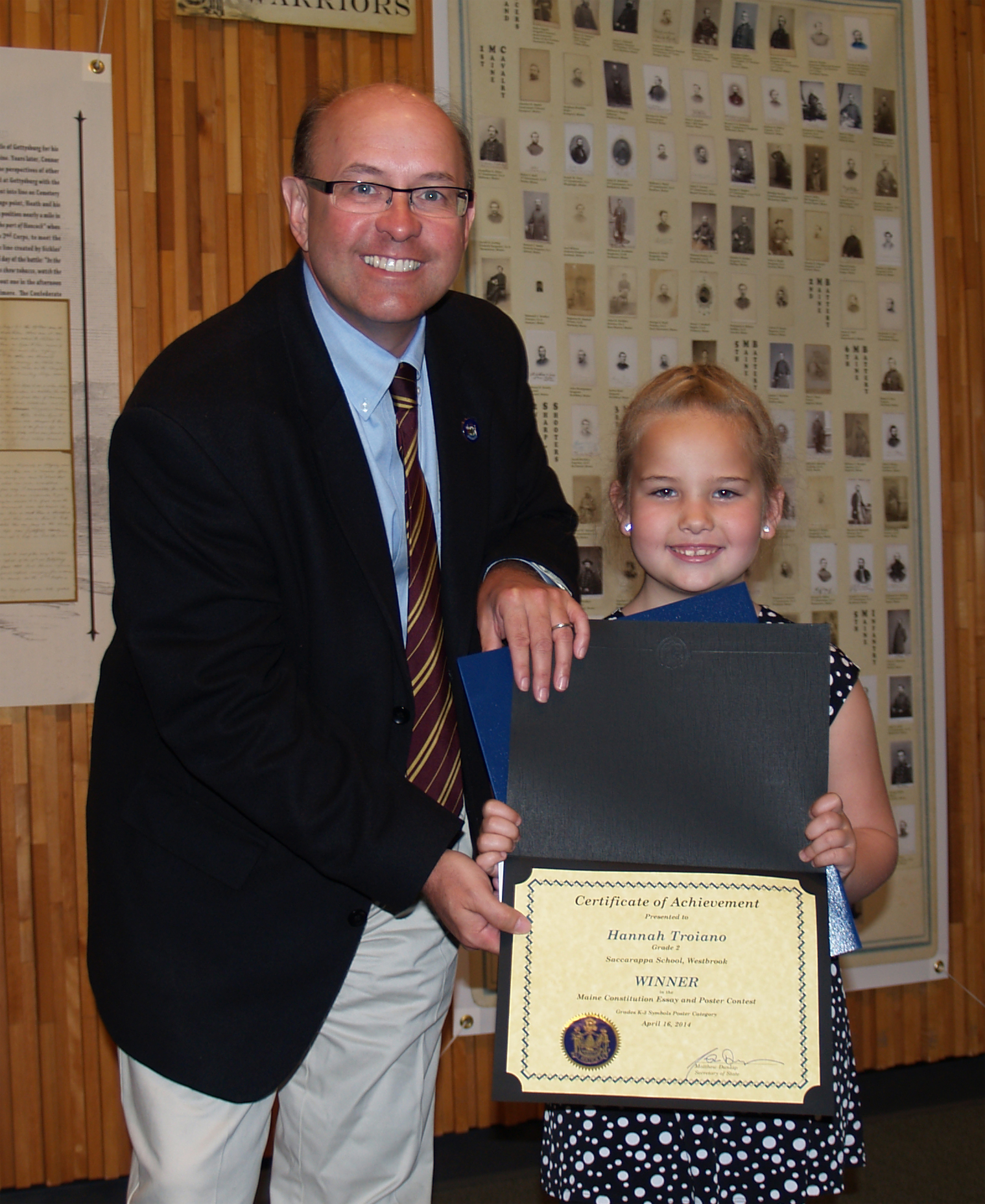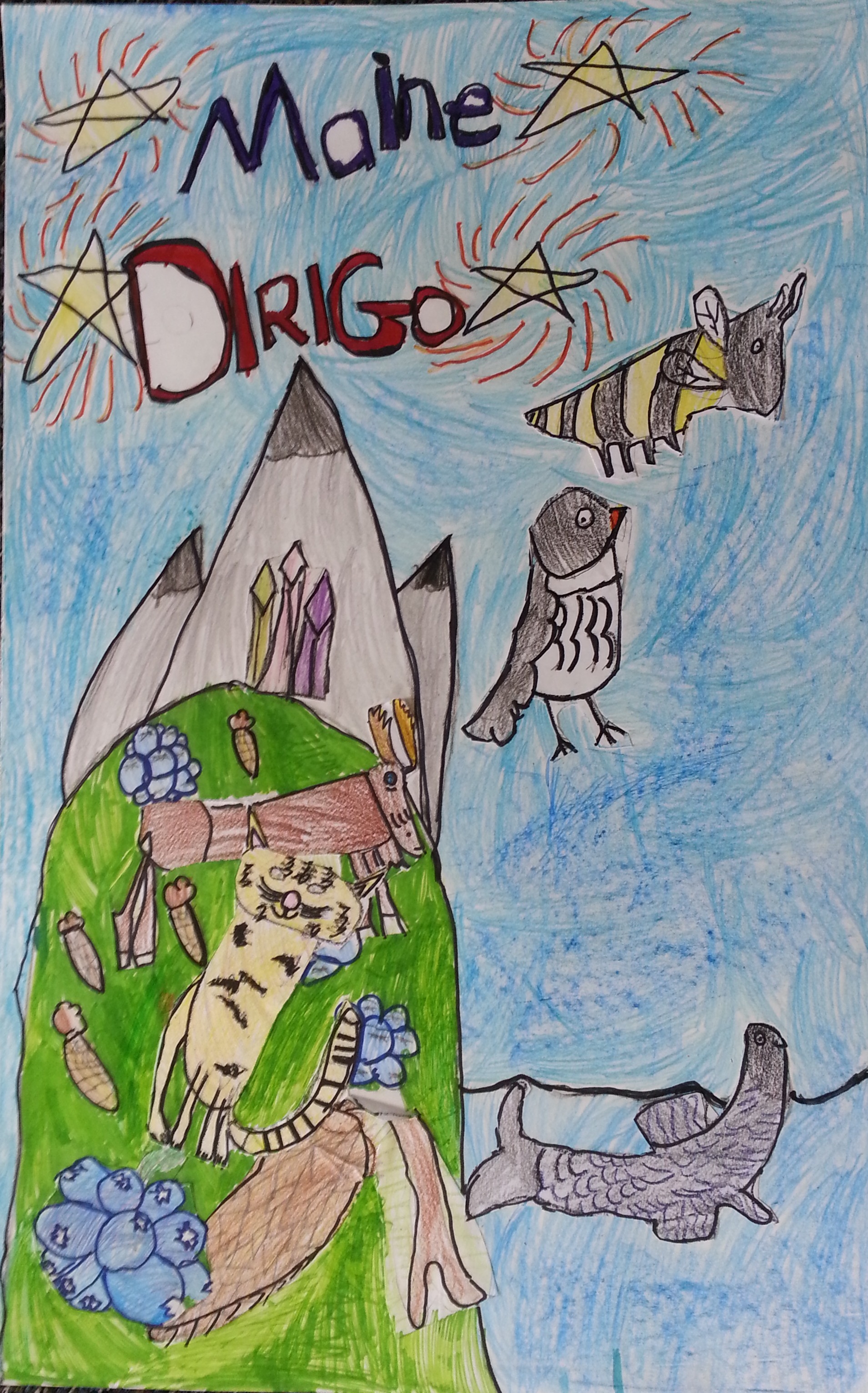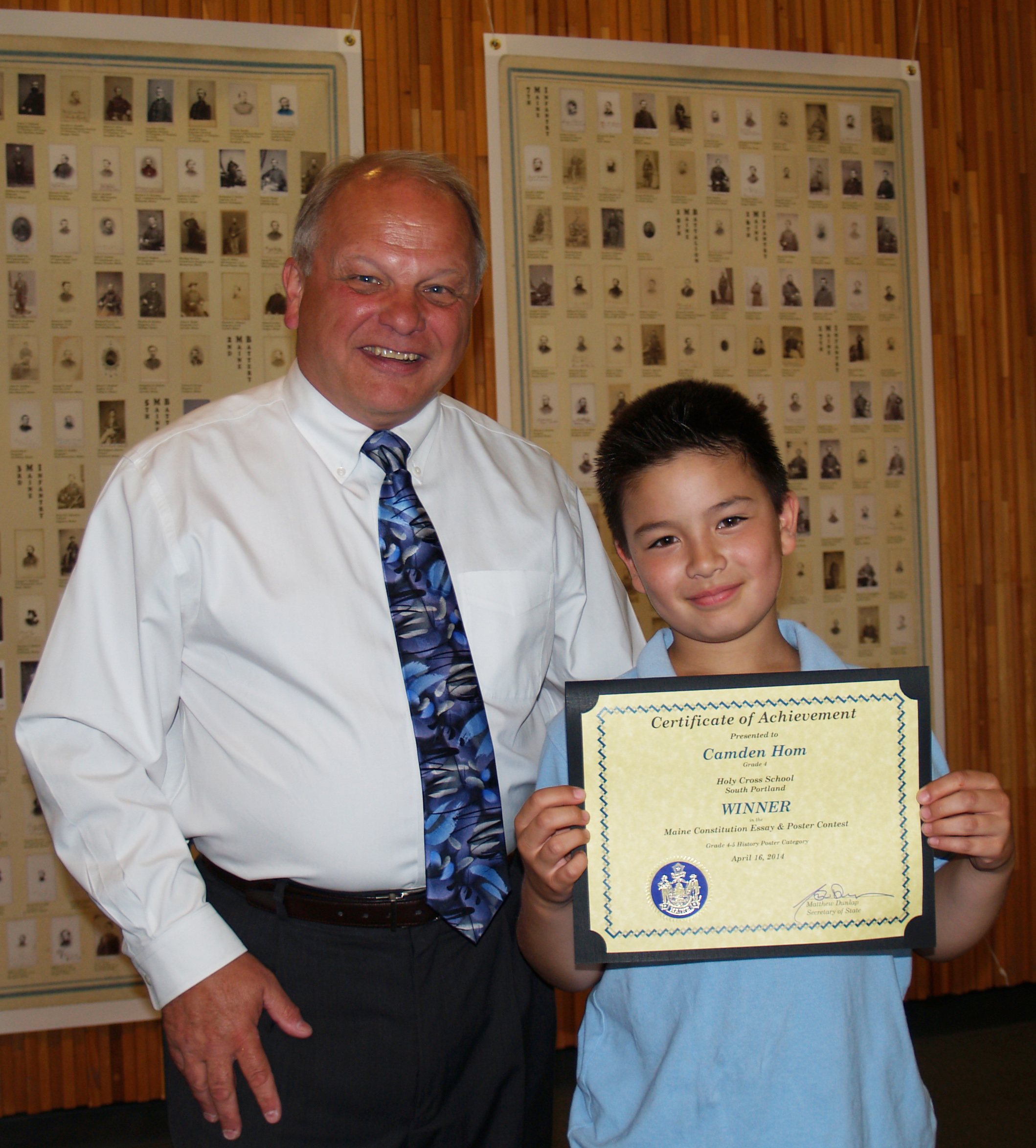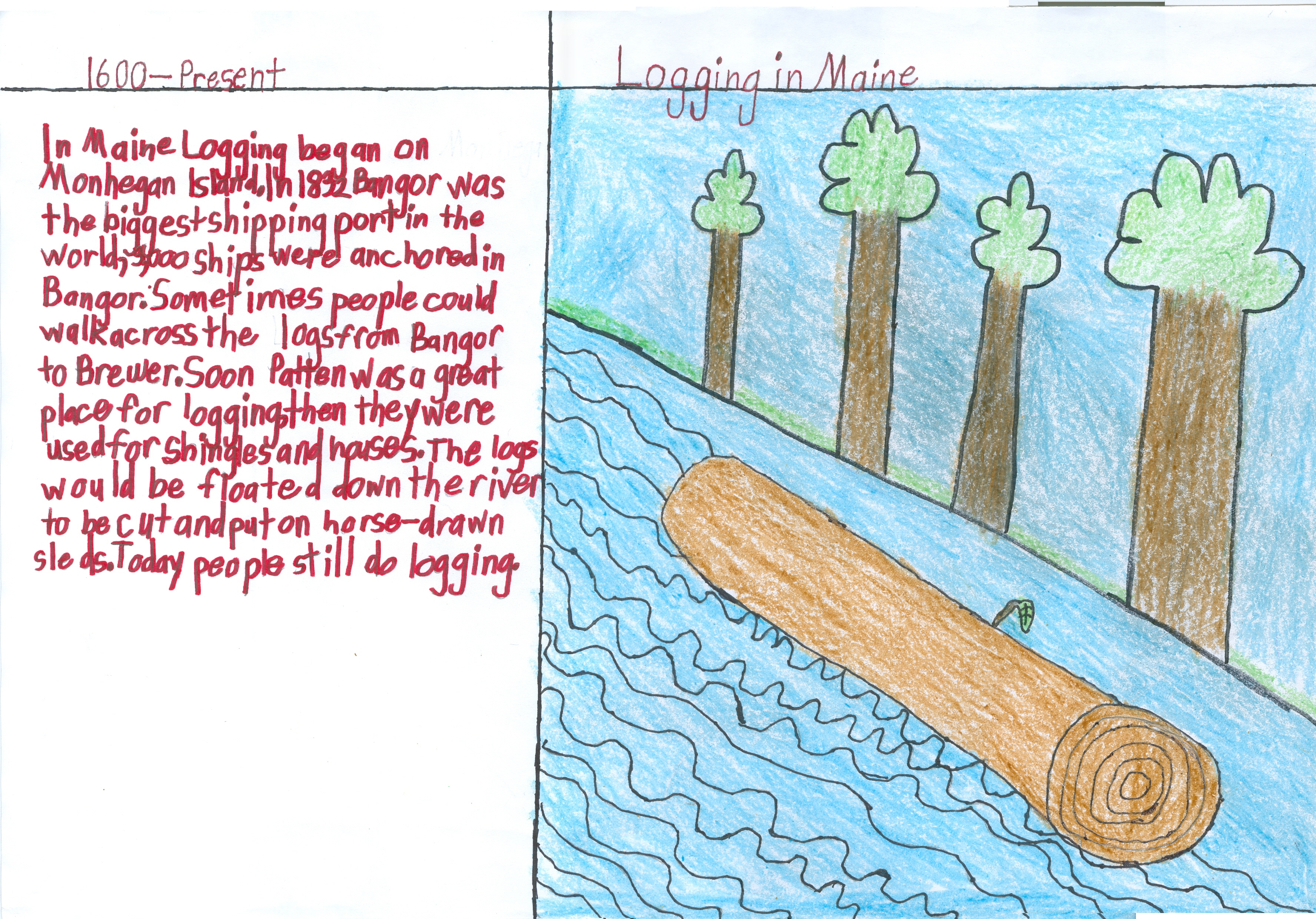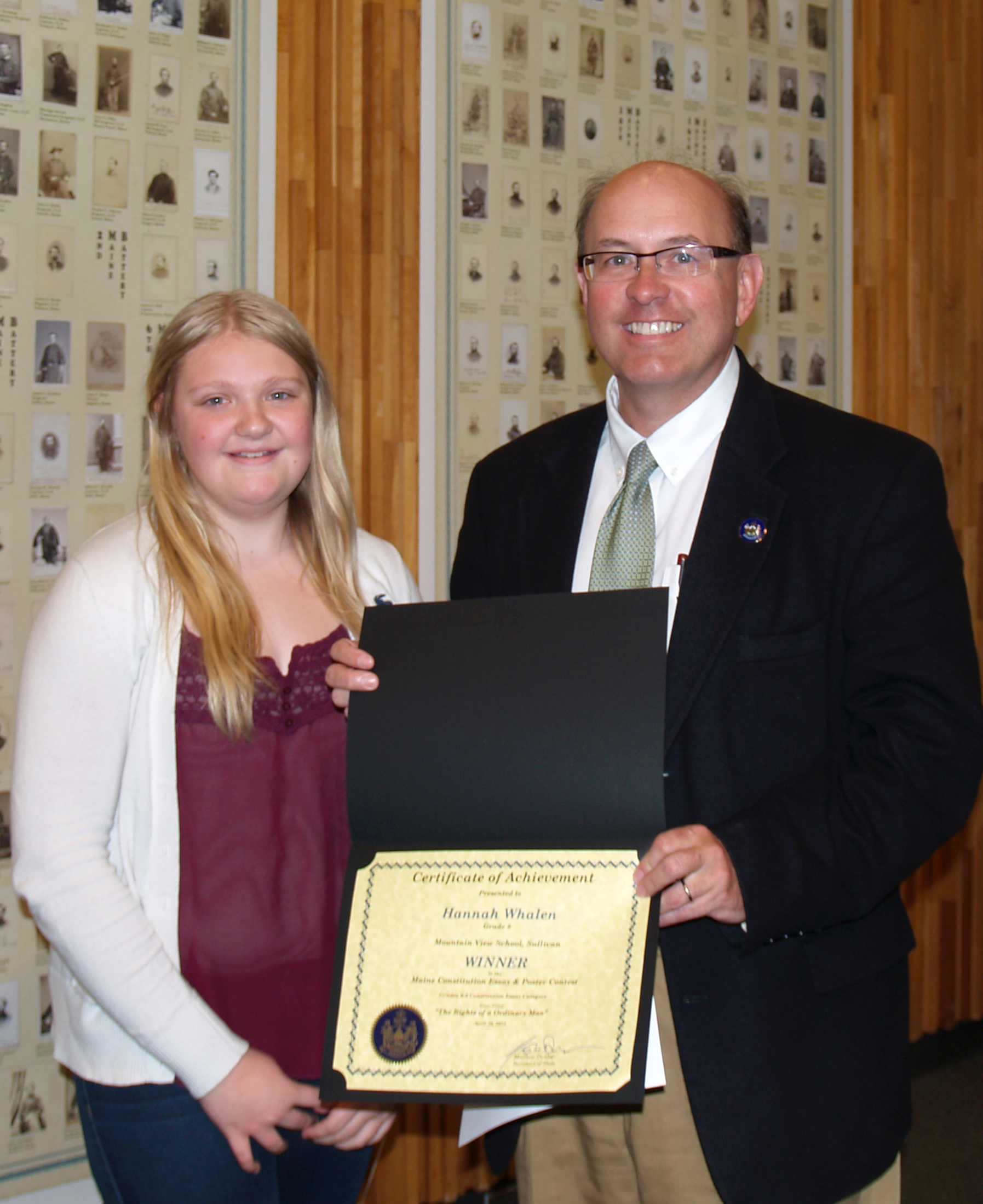
Poster Contest Winners
Hannah Troiano
Saccarappa School, Westbrook
Camden Hom
Holy Cross School, South Portland
Constitution Essay Winner
Hannah Whalen
8th Grade - Mountain View School
"The Rights of a Ordinary Man"
The Maine Constitution, written on March 4, 1820, has lasted the test of time. It has provided Maine citizens with laws and rules that they must abide by. Included in this document are the rights that all Maine residents are endowed. In Maine there are hundreds of communities spaced out all over the state- north to south, east to west, with people that come from different cultures and backgrounds. I have had the opportunity to grow up in a fishing community located in Downeast Maine. My dad is a second generation lobster fisherman- a man who followed in his father's footsteps. He started out as a sternman until he earned enough money to buy a boat. This is how many in our small community make their living. His lively hood depends on his right to fish Maine waters. Just like our forefathers who settled here in the 18th and 19th century- before we were even a state, my family depends on the resources harvested from the vast ocean that surrounds us. But what would happen if we did not have any rights and we're not protected by the Maine Constitution?
What if we didn't have our right to vote? Perhaps lobster fishing would be much different than it is today. If we were not allowed to vote on issues that concerned us, many rights of the fisherman could be taken away such as fishing grounds, day we fish, and trap limits. Lobstering would not be much of a business if it was controlled by outsiders without the fisherman insights or ideas. We have our representatives and senators to fight for us and our rights to earn a living doing what we know best- fish.
Lobstering would be so different if we didn't have the freedom to speak our minds. Without this basic right, we would not have a say on changes in regulations that are constantly being made to our industry. We would have to sit back and absorb what was being handed to us whether we liked it or not. If we did say something our voices would not be heard or would be ignored. The state has the Department of Maine Resources to listen to our concerns and fight for our rights. We don't always agree with the decisions, but at least we have people in place to listen to our concerns.
Besides our boat, fishing gear is our most important asset. You can't fish without the proper gear. How can you fish without gear? A section of the Maine Constitution discusses and constitutional right to our personal property. Often we find that our traps lines have been cut or destroyed our catch lost all because of theft and vandalism or ships who travel in lobstering areas. Gear is expensive! It is important part of our livelihood that keeps food on our tables and fuel in the furnaces that keep us warm in the cold winter months when we are unable to fish. Violators of the personal property provision allow those who take advantage of our constitutional rights to own personal property be punished.
My dad has fished for twenty-four years and has learned so much about the lobstering industry. He is passing his knowledge on to my brother and I. He talks to us about are rights as a citizen of Maine too and how lucky we are to have an opportunity to learn about the Maine Constitution. In school we have been researching how the constitution affects us and our rights.
The laws and regulations that are passed in Augusta might not affect us directly but, in the long run, provide opportunities to the people Maine with a little life.
Our Constitution- it affects all. This document makes sure we have equal rights as a resident of Maine. It protects who we are, our livelihood, and our heritage. How different our lives would be without laws to protect us within the state.
The Importance of Voting and Democracy Essay
Kristen Beal
10th Grade - Acadia Christian School
"Picking the Best"
As a fourth grader at my school said to me, “We vote to pick the best.” She realized that Americans make important decisions when they vote. It is not easy to pick “the best,” but choosing is an important responsibility for Americans. Americans vote because they select the people who make laws that affect them. This type of government is called a representative democracy. In a representative government, voters choose people to represent them in running the government. Americans can choose many representatives. Sometimes, citizens get to vote on local and state policies, which are decisions about what the government should do.
It is important to vote wisely. Voters should learn about the people who are running for office. They should decide whom to vote for after carefully thinking about which person would best represent them.
Even before you turn 18, you can express your opinion through voting at school. Voting for a class representative or favorite book allows you to make a decision. It lets you practice one of the most important rights of an American citizen.
Even though voting is an important part of democracy, it took almost 200 years for our government to allow all adult citizens to vote. In the early days of American government, only white men who owned property could vote. Women, African Americans, Native Americans, and white men without property were not allowed to vote.
It took changes to the Constitution (amendments) before all Americans could vote. In 1868, the 14th Amendment established that African Americans were citizens. Then, in 1870, the 15th Amendment gave African American men the right to vote, but some southern states did not follow the law. Many states required many African Americans to pay a voting tax or pass reading and writing tests before voting. Later, the 24th Amendment and the Voting Rights Act of 1965 gave African Americans the right to vote without limitations. Suffragists – citizens who fight for the right to vote – worked for many years before the 19th Amendment gave voting rights to women in 1920. It wasn’t until 1971 that the 26th Amendment changed the voting age from 21 to 18.
With few exceptions, all adult citizens now have the right to vote in the United States. Citizens must responsibly choose the next leaders. When I am 18, I will be old enough to vote and make decisions about the candidates I want in government. My vote will make a difference, and I will get to participate in one of the greatest privileges for an American citizen.
Even though I am not old enough to vote I still have a voice, and I can participate in government. I am a citizen, and I need to be a good one. These are some ways to get involved now. Learn about the responsibilities of leaders. Go to a public meeting to see how decisions are made. Find out about problems in your community. Listen to the news on television or the radio and read the newspaper. Talk to others about problems you think are important. Writhe letters to public officials, and tell them what you think should be done about a community problem. Learn about the people running for office. Which ones do you agree with? Talk to adults about why they should vote for your choice.
I have much to do. I had better get started.
